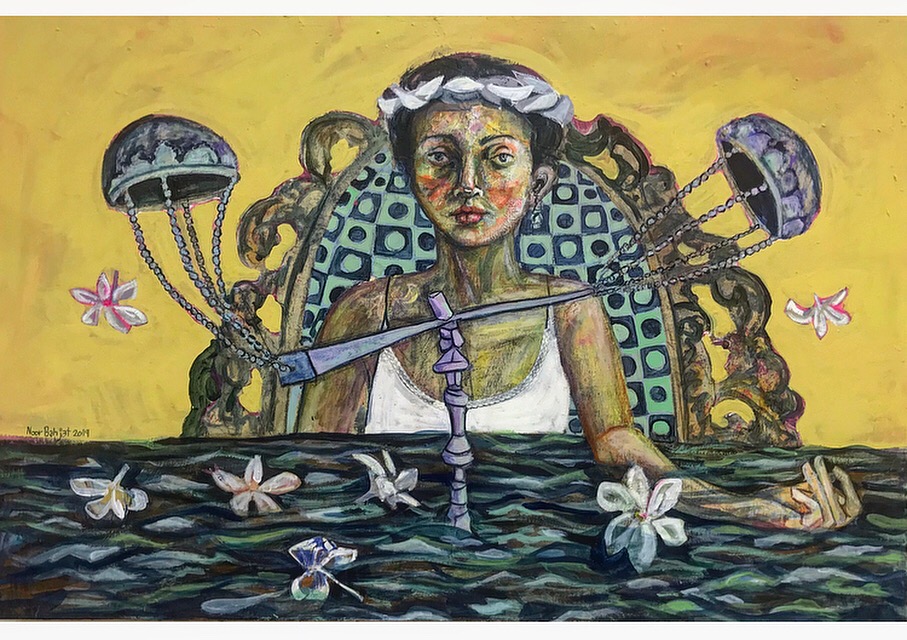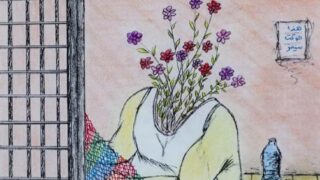
This publication has benefited from the support of the Rosa Luxemburg Foundation. This text may be reproduced in part or in full, provided the source is acknowledged.
In one of Cairo’s streets, Salma stands next to her mother, cooking fast food to people who couldn’t go to fancy restaurants. She looks at her watch’s hands, in anticipation. After a long day of exhausting work, she heads to where she’s going. In the crowded bus, she catches her breath, with difficulty, fearing the violent touches of male passengers. She gets off, smiling, as soon as the bus stops at the desired station, and sighs with relief. The rest of her way she continues by foot, which devours her, until she reaches the university gate, and smiles again, thinking that a few days is all that remains, and she’d then have a PhD in chemistry, her hope and her mother’s, who wished for her daughter to become like her nephew – a university professor.
At university, Salma stands amidst her professors and colleagues, completely elated after all the complements and praise she received. In the streets, however, she knows nothing but running, fearing the looks that followed her body like a doll for grabs. At home, her smile is forced to die down a little when she sees her father and brother, who treat her as if she were the family’s mini minister of finance. At night, she drowns in her pillow, filled with her tears, psychological and perhaps physical pains. She traces the marks left by her brother’s violent and harsh touches. This is how Salma talks about her suffering, in between a reality she lives and wishes to live, which haunts her, amidst the two evils she lives. The first is a new social role to play, which implies a responsibility to spend on her family, following her father’s illness and her brother’s voluntary unemployment. The second is an image that shackles and frustrates her; she remains a female in a patriarchal society, even if she played a man’s role in it.
Meanwhile, the men: We’re wronged!
On November 19th of each year –International Men’s Day– sarcastic voices in Egypt are raised, calling for their own equality with women, saying that women have obtained their rights above and beyond. As such, they refer to the few gains that Egyptian women have obtained following minor amendments to personal status and labour laws, which enabled women to balance their domestic lives with their jobs. Those included a paid maternity leave and support from rights-based associations that supported widows and divorcees. Some even perceive the personal status law to be a feminist law prejudiced against men, and have launched campaigns against it (“Rebellion against the Family Law”, “Egyptian Men’s Alliance against Personal Status Laws”). With every new gain for women in Egypt, media voices are raised, saying: “Women’s time has dawned, and they’ve taken the lead”. Other voices applaud the regime’s speeches, affirming that Egypt is a land of freedom for women, where their dignity is kept. They also point at bills of laws that confirm equity to be a governmental responsibility, listing countless advantages and rights.
The new personal status law bill, leaked to the media in February 2021, is the most prominent example of the legislators’ insistence on more laws that bring women back to the Middle Ages, shackling them with more patriarchal guardianship.
In reality, however, and according to their actual implementation, facts on the ground show a different picture than that painted by social narratives, men’s speeches, and the regime’s cries. For women in Egypt still suffer internal social violence based in a patriarchal cultural legacy, built on discriminating against women in most life’s facets. Although women have gone to tap into the job market as main partners, obtaining an adequate level of higher education, perhaps even high leadership and official positions as well, discrimination against them manifests itself in the laws and dominant and effective systems in Egypt that persist until today – that is, despite some of them having theoretically developed and progressed. Women still face many difficulties in getting their full and equal rights in education, healthcare, and family inheritance; likewise, their right to work, equal pay, and rights to property and housing are still lagging behind. In parallel, some laws deprive them of many rights related to marriage and divorce; as such, they’re left to face a difficult and long battle with discrimination and violence against them, at a moment where reality has imposed new roles on women in fact – that are not met with any transformation in mainstream culture.
The second article of the constitution, acknowledging Islamic sharia laws to be the main source of legislation, has come to authorise legislators to use their power any time to consolidate gender-based discrimination (1). Thus has resulted in hampered equality between men and women. In parallel, articles 11 and 53 of the constitution (2) affirm that there must be no discrimination between the sexes in any way, shape, or form.
The contradictions within the constitution are reflected through the legal provisions (3) that still impart gender-based disparity and discrimination policies. They entrench yet more violence against women, though this time not rooted in society, but practiced by the state itself. How does Egyptian law instil such disparity then?
Out of balance… a distorted scale
Personal Status Law no. 25 (1920), along with its subsequent amendments, embodies the misery that women experience in Egypt. Articles 6 and 11 (bis) decline a wife her right to file for divorce a year into her husband’s marriage of another woman. The article also doesn’t consider polygamy harmful and thus requiring divorce. All the while, the law enforces what is known as “Bayt a-Taa’a” (meaning “house of obedience” in Arabic). In May 2021, the Sheikh of Al-Azhar denied any link between “Bayt a-Taa’a” and Islam. The church also denied there being a “Bayt a-Taa’a” in Christianity either. These statements followed the story of actress Hala Sidqi’s summoning to her husband’s “house of obedience”: as a husband may warn his wife, by resorting to the court, to force her to return to his house. The article is based on a man’s legal guardianship and a woman’s obligation to obey him, even if she were in reality the breadwinner in the family – for women have no legal guardianship.
Furthermore, articles 12 and 14 have determined a full year’s time before a wife could begin to file for divorce in case a husband was absent for no clear excuse or for imprisonment. Likewise, the law does not permit women to file for divorce if they were harmed by her husband’s imprisonment, unless he was sentenced to jail for no less than three years – which falls against some women’s wishes for an immediate separation.
A Central Agency for Statistics report in 2017 revealed that the number of marriages in that same year for the age group of 10-17 reached around 117 thousand common-law religious marriages, which makes up 40 percent of all marriages back then.
Perhaps the difficulties of divorce (4) in Egypt do not affect Muslim women only, but rather encompass Christian women too, who suffer articles 3 and 17 of Law no. 1 (2000). Those stipulate that non-Muslims should follow their own religious personal status laws, in case it’s a same-religion marriage. Otherwise, the Islamic sharia should be applied. This has pushed many Christian women to convert, to be able to obtain the right to divorce, in a kind of cheating the system (according to an unofficial census). According to the latter, the number of divorce cases between 2010 and 2012 alone had reached 300 thousand among Christians, while no official data is available on the number of cases being deliberated this year. All fingers possibly point however to a double of that number.
Perhaps the new personal status law bill, which was leaked to the media in February 2021, is the most prominent example of the legislator’s insistence on more laws that bring women back to the Middle Ages, shackling them with more patriarchal guardianship. According to the proposed bill, women wouldn’t be able to get married without a male guardian, who would also be able to cancel a marriage contract, based on inequality, determined at his own discretion. The customary law would also grant authority to a legal guardian to marry a girl off, even if she were still a minor, through a common-law religious contract. This has aggravated underage marriage rates among girls. A Central Agency for Statistics report in 2017 revealed that the number of marriages in that same year for the age group of 10-17 reached around 117 thousand common-law religious marriages, which makes up 40 percent of all marriages back then.
Article 17 of the code grants a judge the right to grant clemency in cases of rape, harassment, and honour crimes, thus thwarting the efforts made to fight crimes of sexual violence. The police system must be revisited in police departments: many assault and rape complaints end before even starting because of the policemen’s treatment of female victims filing the complaint, amidst shaming looks and statements, sometimes accusing them of being “sluts”.
According to the proposed bill, a wife wouldn’t be granted custody over her children, whereby child custody would be transferred to the grandfather, right after the father. Even if eventually granted child custody, a mother has no right to financial guardianship over her children. Furthermore, she cannot sign forms that approve surgical operations to be carried out on her children. Likewise, her children couldn’t travel with her without a written permission from her husband or one of the male family members. It is this fact that women frequently mock, saying: “I’m a minister, ambassador, and a judge, yet have no right to a mere mundane signature related to my children.”
Women without guardianship, violence against them justified
The law regulates disciplining females through male legal guardian. According to article 242 of the law, discipline is meant to authorise doing harm, but without exceeding slight physical abuse. Article 60 of the penal code is used as men’s saviour, whereby it stipulates that “the penal code’s provisions aren’t applicable to acts committed with good intentions, that are in line with a given right, in conformity with the sharia”. As such, a man is granted the right to discipline a woman by hitting her, based on a religious premise and backed by the law, as long as the disciplining act does not lead to death or severe harm. At the same time, violent crimes against women (5) have reached horrifying numbers. Even the National Women’s Council estimated, in its most recent report, that the numbers have increased, since the Covid-19 outbreak, by nearly 30 percent.
“Nakad”: that sly trick to silence women
01-01-2022
Rights advocates believe that article 17 of the code should be revisited, which grants a judge the right to grant clemency in cases of rape, harassment, and honour crimes, thus thwarting the efforts made to fight crimes of sexual violence. They equally demand that the police system must be revisited in police departments. Many assault and rape complaints end before even starting because of the policemen’s treatment of female victims filing the complaint. All the while, victims suffer shaming looks and statements, sometimes accusing them of being “sluts”.
According to the proposed bill, a wife wouldn’t be granted custody over her children, whereby child custody would be transferred to the grandfather, right after the father. Even if eventually granted child custody, a mother has no right to financial guardianship over her children. Furthermore, she cannot sign forms that approve surgical operations to be carried out on her children. Likewise, her children couldn’t travel with her without a written permission from her husband or one of the male family members.
The legislator not only showed bias towards men in domestic violence cases, but also distinguished between a husband and a wife’s adultery. A woman is thus given a prison sentence of up to two years, whereas a husband is sentenced to no more than six months (articles 274 and 277). Moreover, he distinguished between providing evidence of a wife’s infidelity and that of her partner’s. Due to such restrictions, it is permissible in some cases to judge an adulteress whose infidelity has been proven by a witness’s or a spouse’s testimony, while her male partner is pronounced innocent for lack of evidence that could be accepted in court against him.
Inheritances
According to the Inheritance Law no. 77 (1943), a woman has a right to half her brother’s inheritance, in accordance with Islamic sharia. Relatives also have a right to share the inheritance where a woman has no brothers for heirs. Although the Christian doctrine has acknowledged equality between men and women in inheritances, Christian men appeal to Islamic sharia to get their hands on a bigger inheritance! Women (both Muslim and Christian) still do not control their inheritance, especially in Upper Egypt, desert regions, as well as in places and milieus where women are marginalised to a large extent. A breakthrough was noted however when a court in Alexandria passed an unprecedented ruling to annul the claim to inheritance no. 198 (2021) and dividing a deceased Christian citizen’s inheritance by Christian doctrine provisions and Evangelist Coptic rules.
Liberties and rights
The Egyptian security authorities insist on enforcing restrictions on women (especially independent ones) in relation to freedom of movement, mobility, and residence, and in contradiction with the constitution and its articles stipulating equality and prohibiting discrimination. Article 62 guarantees freedom of movement and residence, and so do articles 161, 176, and 309 of the penal code. They list penalties related to any act that could possibly discriminate between individuals, harm them, or undervalue them.
The law doesn’t permit abortion, even in cases where pregnancy was the result of rape or adultery. The Egyptian fiqh has settled on its impermissibility for fear of abusing the right to abortion. According to medical regulations in Egypt, a written approval from a male legal guardian is required when it comes to operating surgeries on a woman’s reproductive system, like removing a uterus or breaking a woman’s hymen in cases where it causes health complications.
However, 1 and 3-star hotels refuse, based on tacit security instructions, women under forty as guests if not accompanied by a male relative. Security authorities assume that such a measure aims to fight sex work. At the same time, though, they apply such guidelines only to low-income women, rather than upper class women in luxury hotels. They thus entrench an inferior perception of women -with a modest income- and treat them as no more than a mere sexual commodity.
Women also do not have a right to housing, especially those hailing from middle and lower classes. In popular neighbourhoods, owners refuse to rent out their places to a woman without a male legal guardian, as per verbal instructions issued by local police departments and administration. Naturally, this consolidates social perceptions of independent females, and the sexual and moral suspicions created around them. Perhaps the Salam doctor’s murder in March 2021 reveals the state of affairs that society has reached, as a result of the legal protection of patriarchal customs given religious cover.
The Egyptian state doesn’t grant women the right to a safe abortion, and considers it a crime. The law doesn’t permit abortion, even in cases where pregnancy was the result of rape or adultery. The Egyptian fiqh has settled on its impermissibility for fear of abusing the right to abortion. According to medical regulations in Egypt, a written approval from a male legal guardian is required when it comes to operating surgeries on a woman’s reproductive system, like removing a uterus or breaking a woman’s hymen in cases where it causes health complications.
Furthermore, women have no full rights to movement and travel, that is, despite the constitutional court’s order to the effect that women have a right to travel without obtaining a prior permission from a man. And yet, women’s freedom of travel is repeatedly taken away by court orders, to which a male family member appeals, in accordance with Personal Status Law no. 1 (2000).
Based on tacit security instructions, 1 and 3-star hotels refuse women under forty as guests if not accompanied by a male relative. Security authorities assume that such a measure aims to fight sex work. At the same time, though, they apply such guidelines only to low-income women, rather than upper class women in luxury hotels. They thus entrench an inferior perception of women -with a modest income- and treat them as no more than a mere sexual commodity.
The question remains then, how will the current system minimize gender-based discrimination when it is currently making more laws that blow away women’s rights? And how does Egyptian popular opinion think women have more rights? Despite the enduring oppression and restrictions, along with all its subsequent and multiple forms of violence, especially disguised violence, it is culturally hushed, though present and known. It is engulfed with complicit silence, in a culture based on considering such matters a private family affair that should be avoided, or a question that affects a female’s honour in her own social milieu. Economic violence is yet another question that women face, along with forced or early marriages for girls, verbal, mental, physical, and sexual violence, as well as modern electronic violence, and other forms of violence. Most dangerous of these forms of violence, however, and its most severe, is murder, attacking a woman’s right to life.
The content of this publication is the sole responsibility of Assafir Al-Arabi and Rosa Luxemburg Foundation cannot accept any liability for it.
Translated from Arabic by Yasmine Haj
Published in Assafir Al-Arabi on 15/01/2022
1- Mada Masr website, Custody is my Right: Some of what women in Egypt cannot do. https://bit.ly/3GdGCIm.
2- See; Egypt’s amended constitution, 2019: https://manshurat.org/node/14675
3- See: Malek al-Adli, Tatawwur al-Fiqh al-Qadaai fi Qadaya al-Mara’a, a legal paper, The Centre for Women’s Matters in Egypt, 2019.
4- See “A Reading into the Statistics of Personal Status Cases,” a published research, Institute for Women’s Matters, 2017.
5- In 2020, the Central Agency for Statistics stated that 5 million and 600 thousand women are exposed to domestic violence on an annual basis.






